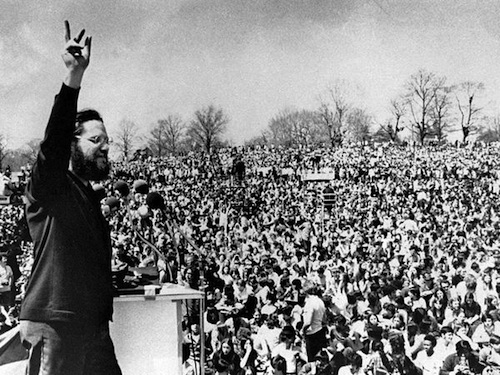“This planet is threatened with destruction — and, we who live in it, with death.”
This were some of the first words associated with Earth Day when it started — way back in 1970 — and despite being depressing, the other thing is: well, they’re still true. You can argue for a long time about the relative success of “Earth Day” as a concept — it can be argued that it led to the creation of the EPA, as well as the Clean Air, Clean Water, and Endangered Species Acts. But … it’s 2014 and we’re above 400 ppm (parts per million) on the global warming front, and the planet just doesn’t seem to care about its future (again, the unstated issue: “I’ll probably be dead when that happens regardless.”) So while Earth Day may or may not be a success, it’s still relevant to look at how the movement got started (as similar movements do crop up regularly in the modern age).
Gaylord Nelson, a Senator from Wisconsin, is perhaps most credited with the development of Earth Day — he actually received the Presidential Medal of Freedom in 1995 for his role in it — and the basic story is here: he had given water quality speeches in Santa Barbara, CA in 1969, then toured its beaches to see the effects of a recent spill. Those scenes essentially led him to come up with the idea of a “national teach-in,” which became Earth Day. Here’s how they really ramped it up:
On Jan. 18, 1970, a full-page ad in The New York Times introduced Earth Day: “It is a day for looking beyond tomorrow. April 22 seeks a future worth living. April 22 seeks a future.”
Pete McCloskey was a Republican Representative from CA (the opposite party of Nelson, thus) and Denis Hayes was a Stanford graduate now doing grad-school work at Harvard; they were the other two major developers of Earth Day. McCloskey was a Korean War hero — and was the first GOP legislator to call for Nixon to be impeached — and Hayes is now CEO of the Bullitt Foundation in Seattle, which promotes responsible human living and sustainable communities.
The inherent enigma of Earth Day has been detailed by many critics, and here’s one article in that same vein:
An unfortunate result of appreciating our ecosystem complexity and interdependency is to confound many who have neither the time nor patience to understand statistics and scientific methods needed to make informed decisions, choosing instead to rely upon the views of selected “experts” and political pundits. When doing so it is vital to consider their motives before accepting their views – since many are funded by those that profit from ecosystem abuse. Realize too that many climate change deniers go so far as to assert that scientists like me are puppets of a left-wing conspiracy of universities and media titans to aggrandize ourselves at your expense. I assure you that nothing is further from the truth as we prognosticate our collective demise in the alternative to responsible action.
There’s that whole cliche about no one being a Republican before 40, and no one being a Democrat afterwards; the idea is that as you become wealthier and have a family, your concerns shift from liberal causes to more conservative ones. For sure. Well, first off, I don’t think “turning 41” is necessarily going to be a synonym for “gaining in your career” across the next few decades, but hopefully I’m wrong about that. Second off, just because you have two kids and a mortgage and more conference calls doesn’t mean you should stop caring about the environment. In fact, it probably means you should care more. The problem with the environmental movement is the same as the problem with other movements: first of all, you’re essentially asking people to sacrifice their way of living for a generation they won’t be a part of. The human brain doesn’t work that way. Secondly, those at the forefront of environmental movements tend to be granola-associated guys not in suits. The dudes in the world who make the decisions and control the pursestrings are the antithesis of that. Again, it all goes back to in-group/out-group. That’s the reason you couldn’t sit at the cool table in HS, and that’s part of the reason that the environmental movement doesn’t get the traction it should. (There are exceptions, though.)
